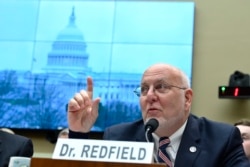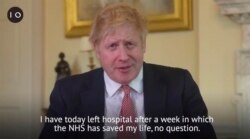Two people in Northern California died from the coronavirus weeks before the first previously recorded U.S. deaths.
Autopsies show that a 57-year-old woman who died in her home on Feb. 6, and a 69-year-old man who died at home on Feb. 17 both had COVID-19. Both lived in Santa Clara Country and neither of them had traveled weeks before their deaths.
The first previously known death from COVID-19 in the United States was on Feb. 26 in Seattle, Washington.
The information provided by local officials helps explain how early the virus was spreading in the country. Health officials say the person who died in early February most likely got infected in January, when tests were only available to people who had recently traveled. Officials say it is very likely that other people died of COVID-19 earlier without being diagnosed.
The United States has had nearly 850,000 confirmed COVID-19 cases and more than 47,000 deaths from the disease. There are signs that the number of new cases is declining in some states, but the daily death toll remains high.
Several U.S. states have already started to reopen businesses and ease travel restrictions, despite warnings from local elected officials and some health experts that those actions may be premature.
U.S. President Donald Trump on Wednesday tweeted, “Our Country is starting to OPEN FOR BUSINESS again.”
Later he brought the head of the U.S. Centers for Disease Control and Prevention to the White House briefing to clarify his warning about the second wave of the coronavirus in winter.
CDC Director Robert Redfield said Tuesday that the second wave of epidemic could be more difficult than the first. On Wednesday he explained that he meant “it will be more difficult in that we will have two viruses circulating at one time.”
In other parts of the world the pandemic is at various points of its trajectory. The World Health Organization said Wednesday that most countries are still in the early stages of their epidemics, with "worrying upward trends" in parts of Africa and central and South America.
Russia had nearly 60.000 COVID-19 cases on Wednesday — a 10% increase in one day. Most of them, close to 32,000 are registered in Moscow. More than 500 people have died so far. Russian President Vladimir Putin has cancelled a referendum on constitutional amendments that was to take place Wednesday and an elaborate military parade marking the 75th anniversary of victory over Nazi Germany in World War Two that was set for May 9. He is working from an official residence outside Moscow where he holds meetings by video conference.
Some European countries are seeing a steady decline in the number of new infections and hospitalizations, but British health officials said they did not see a steep decline in new infections. Another 759 people have died in hospital, bringing the toll to 18,100.
British Prime Minister Boris Johnson is still recovering from COVID-19, after being discharged from the hospital on April 12 to his official London residence. British health officials said the University of Oxford is set to begin testing a vaccine on people Thursday. Other countries including the United States and Russia also are working to develop a vaccine.
The World Health Organization also said that some countries are seeing a resurgence in cases and warns against relaxing protective measures too soon. The head of the organization said lockdowns and other “distancing measures” have curbed the spread of the virus in many countries and that complacency is now “one of the greatest dangers we face.”
Germany has ordered people to wear masks when in public as a protective measure as it begins re-opening the country. Spanish Prime Minister Pedro Sanchez is planning to ease the shutdown in the second half of May.
With many countries around the world focused on testing programs to find the infected, isolate them and trace down their close contacts, there are concerns about areas where widespread testing is not available and where people are living in close quarters.
That includes refugee camps, and on Wednesday the U.N. agency for Palestinian refugees reported the first confirmed case in a camp in eastern Lebanon.
Human Rights Watch called on the Greek government to relax pressure and improve hygiene in overcrowded refugee camps on Greek islands to prevent a health crisis.






